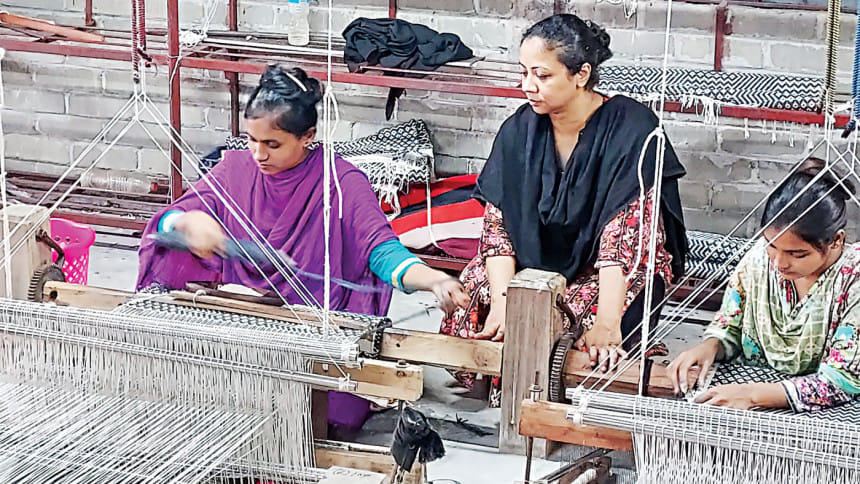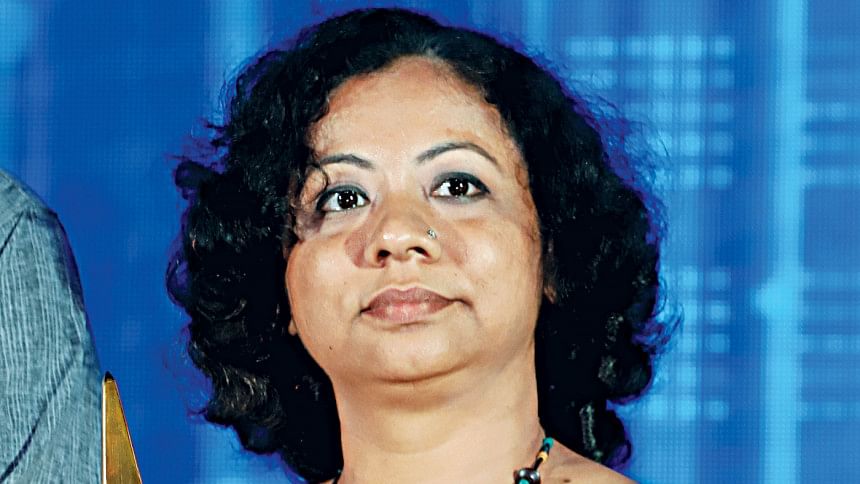The visionary behind Sutar Kabbo

Although the jute industry of Bangladesh continues to struggle despite offering an array of eco-friendly products that could diversify the country's export basket, Mosammat Shirajum Munira has done some remarkable work in this field.
Munira is the founder and CEO of Sutar Kabbo, which specialises in producing jute handicrafts that have found their way to both domestic and international markets, including Japan, Germany, Australia and Kuwait.
Other than that, she has seen exceptional success in transforming the lives of economically disadvantaged rural women in Parbatipur upazila of Dinajpur by offering training and employment opportunities at her local manufacturing unit.
In recognition of her achievements, Munira won the "Outstanding Woman in Business" award at the 21st DHL-Daily Star Bangladesh Business Awards, held at the Sheraton Dhaka on October 17 this year.
Sutar Kabbo specialises in crafting a diverse range of jute products, including bags, mats, baskets, and shatranji (a type of floor covering). The enterprise sources raw materials from various parts of Bangladesh, employing handloom machines and hand-knotted techniques to ensure the highest quality products.
Born in 1980 in the northern district of Thakurgaon, Munira's father was a teacher and her mother served as a government officer. She is third among her four siblings. After completing her secondary education in Thakurgaon, she embarked on her academic journey in Dhaka, joining Badrunnesa College for HSC. Afterwards, she pursued Bachelor's and Master's degrees in linguistics at Dhaka University.
"In 2008 I joined the ICCDR,B as a researcher. A year later, I became a research coordinator at LAMB Hospital in Parbatipur. It was during this time that my husband, who was my classmate at Dhaka University, and I dreamt of making a more significant impact on our community," she said.

I especially wanted women to bring their children to work so that taking care of their child did not hinder their work.
"It wasn't until 2017 that our dream materialised in the form of Sutar Kabbo," Munira added.
Her inspiration to work with jute-related products stemmed from her desire to address the challenges faced by Parbatipur's disadvantaged people, particularly women. Many of these women lacked education and income opportunities, making their lives a continuous struggle. The idea of utilising jute as an environmentally friendly and sustainable resource led to the formation of Sutar Kabbo in 2017, with a modest opening capital of Tk 10,000.
Munira said recruiting women for Sutar Kabbo was not without its challenges. Resistance from families and communities was a constant hindrance as many were doubtful of women working outside their homes. But her continuous efforts were pivotal in convincing women that joining Sutar Kabbo would be beneficial for both them and their families.
"I understood early on that in order for women to leave their home setting and step outside to work, I had to provide some facilities so that they would feel comfortable here," she said.
These included separate bathrooms, kitchen amenities, childcare facilities and prayer rooms.
"I especially wanted women to bring their children to work so that taking care of their child did not hinder their work," Munira added.
While all this affected her production costs, she said that it was ultimately a very timely investment as the workers needed that environment to help them transition from their homes to a workplace.
"I feel as a woman, it's tough to be involved with a job if there's no one to look after my children and that's something very worrying. I may have the privilege to have someone at home to look after my child, but not everyone has that chance," Munira said.
"Does that mean she won't work, or if she has a talent, she won't use it to get success? I can say from experience that those who got this opportunity at Sutar Kabbo appreciated it and used it to their advantage," she added.
Sutar Kabbo faced its biggest challenge in the form of the Covid-19 pandemic, which caused drastic disruptions to the supply chain, reduced demand and ultimately led to the closure of units during lockdown.
Along with professional challenges, she had to deal with personal trials too. Her five-year-old daughter has been battling cancer for the last two years and Munira has been by her side providing constant care while contending with significant medical expenses.
Still, she has persevered, driven by her mission to run a sustainable operation with Sutar Kabbo, and this is evident when we look at her organisation's financial performance.
Over the years, Sutar Kabbo has achieved remarkable financial success and stability. With working capital of Tk 75 lakh and assets valued at Tk 25 lakh, the enterprise boasted an annual turnover of Tk 1.85 crore and a healthy profit margin of 12 percent in 2022. Its debt-to-equity ratio stands at 25:75, reflecting prudent financial management. The annual growth rate in sales remains impressive at 20 percent.
Munira has been pivotal in the establishment of a training centre to develop the skills of Sutar Kabbo's craftsmen. Their present set-up consists of two factory units set up with 42 looms, 2 zigzag sewing machines, 2 plain-sewing machines and a designated place for hand-knitted crafts.
She has also established a network with 700 rural artisans in Naogaon, Kushtia, and Kurigram who sew, needle and braid crafts. Sutar Kabbo has a showroom beside the factory and a Facebook page for online sales and marketing of their products.
Sutar Kabbo is a member of several prominent organisations that share its vision and values. These include the Jute Diversification Promotion Centre, Bangladesh Small and Cottage Industries Corporation, Joyeeta Foundation under the Ministry of Women and Children Affairs, National Association of Small and Cottage Industries of Bangladesh, and SME Foundation.
Associating with different trade bodies has been beneficial for Munira. She said that attending various fairs both at home and abroad helped her organisation get the necessary exposure to a wide range of buyers.
She lauded the government for implementing such a strategy to give entrepreneurs like her the chance to showcase products to diversified customers, enabling them to sell their products at the fairs and most importantly, communicate and acquire new buyers.
Sutar Kabbo's exceptional designs and craftsmanship have not gone unnoticed. The enterprise secured the Best Jute Product Stall Award at the 9th SME Fair.
It even participated in the New York Fair in America, with support from the SME Foundation and US AID Feed the Future Project and TFO Canada, showcasing its commitment to global markets and sustainability.
Munira's journey with Sutar Kabbo has been full of integrity, adaptability and tenacity that has complimented her entrepreneurial leadership.
As she has already contributed to the betterment of scores of rural women's financial freedom, she dreams to expand her organisation on a bigger scale to help Bangladesh's economic development.

 For all latest news, follow The Daily Star's Google News channel.
For all latest news, follow The Daily Star's Google News channel. 



Comments